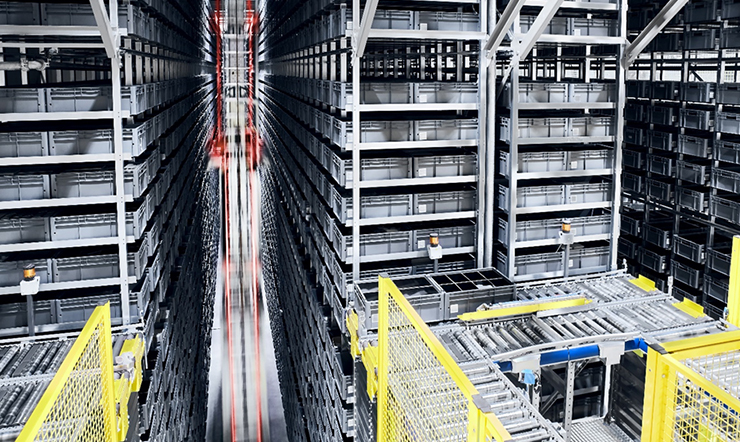In the rapidly evolving landscape of warehousing and distribution, automation has become crucial for efficiency and productivity. Among the various automated solutions available, Automated Storage and Retrieval Systems (ASRS) stand out as a critical investment for businesses seeking to optimize their operations.
Choosing the right ASRS provider is very important to maximizing the benefits of this technology. When selecting an Automated Storage and Retrieval System (ASRS) provider, several critical factors must be considered to ensure the chosen solution aligns with your operational needs and future growth plans.
This blog will delve into the key considerations that should guide your decision-making when selecting an ASRS provider.
System Compatibility and Customization
Understanding Your Needs
Before choosing an ASRS provider, it’s essential to understand your specific requirements thoroughly. Factors such as the types of products you handle, storage density, retrieval frequency, and the physical constraints of your facility play a significant role. The ASRS provider should offer systems compatible with your current operations and adaptable to future needs.
Customization Capabilities
Every business has unique operational demands. A reputable ASRS provider should offer customizable solutions tailored to your workflow. This includes adjustable shelving, flexible software integration, and scalable systems that can grow with your business.
Technology and Innovation
Advanced Automation
The technological capabilities of an ASRS provider are a critical factor. Look for providers that utilize cutting-edge technology, such as advanced robotics, AI-driven inventory management, and IoT integration. These features can significantly enhance the efficiency and reliability of your storage and retrieval processes.
Innovation Track Record
Evaluate the provider’s track record in innovation. Providers who continually invest in R&D and incorporate the latest advancements in their systems are more likely to offer robust and future-proof solutions. This ensures your ASRS will not become obsolete quickly and can adapt to evolving industry standards.
Software Integration and Compatibility
Seamless Integration
An effective ASRS should integrate seamlessly with your existing Warehouse Management System (WMS) or Enterprise Resource Planning (ERP) software. This integration is vital for real-time inventory tracking, order processing, and data analytics. Ensure the ASRS provider offers robust software solutions that can easily interface with your current systems.
User-Friendly Software
The software provided should be user-friendly, offering intuitive interfaces and comprehensive support for various functions. Training and onboarding should be straightforward, minimizing disruption to your operations. Additionally, look for software that provides detailed analytics and reporting capabilities to help you make data-driven decisions.
Reliability and Support
System Reliability
The reliability of an ASRS is non-negotiable. Downtime can lead to significant disruptions and financial losses. Investigate the provider’s reputation for system reliability, including their maintenance protocols and the average lifespan of their systems.
Customer Support
Exceptional customer support is essential. Choose a provider that offers comprehensive support services, including 24/7 technical assistance, regular maintenance checks, and quick response times for repairs. The provider should also offer training programs for your staff to ensure they are proficient in operating and maintaining the system.
Scalability and Flexibility
Future Expansion
Your business will likely grow and evolve, and your ASRS needs to accommodate this growth. Select a provider that offers scalable solutions, allowing you to expand your storage capacity and enhance system capabilities as your needs change.
Operational Flexibility
Flexibility in system design is also crucial. The ASRS should be adaptable to different product types, storage environments, and retrieval speeds. This versatility ensures the system can handle peak periods and varied inventory without compromising efficiency.
Cost Considerations
Total Cost of Ownership
While the initial investment is important, the total cost of ownership (TCO) provides a more comprehensive financial perspective. Consider factors such as installation costs, ongoing maintenance, software licensing fees, and energy consumption. A lower upfront cost may not always translate to long-term savings if the system is expensive to maintain or operate.
Return on Investment
Evaluate the potential return on investment (ROI) offered by the ASRS. Consider how the system can improve operational efficiency, reduce labor costs, minimize errors, and enhance customer satisfaction. A high-quality ASRS should deliver substantial long-term savings and productivity gains that justify the initial expenditure.
Compliance and Safety
Regulatory Compliance
Ensure the ASRS provider complies with industry standards and regulations. This includes safety standards, environmental regulations, and any specific requirements relevant to your industry. Compliance with these standards ensures the system is safe to operate and environmentally sustainable.
Safety Features
Safety is paramount in any industrial operation. Look for ASRS providers that incorporate advanced safety features into their systems, such as emergency stop functions, safety barriers, and real-time monitoring for potential hazards. Proper safety features protect both your employees and your inventory.
Track Record and References
Industry Experience
A provider’s experience in your specific industry can be a significant advantage. Providers with a proven track record in similar industries are more likely to understand your unique challenges and offer tailored solutions that have been tested in comparable environments.
Customer References and Case Studies
Request customer references and review case studies to gain insights into the provider’s performance and reliability. Speaking directly with other businesses that have implemented the provider’s ASRS can provide valuable firsthand feedback on their experiences, including any challenges and the overall impact on their operations.
Conclusion
Choosing the right ASRS provider is a critical decision that can significantly impact your operational efficiency, cost-effectiveness, and long-term success. By considering factors such as system compatibility, technological innovation, software integration, reliability, scalability, cost, compliance, provider track record, and sustainability, you can make an informed choice that aligns with your business goals. An effective ASRS not only streamlines your storage and retrieval processes but also positions your business for future growth and competitive advantage.
FAQs
1. What factors ensure system compatibility and customization in an ASRS provider?
Ensure the provider’s system can handle your products, storage needs, retrieval frequency, and facility constraints. Look for customizable solutions like adjustable shelving and scalable systems.
2. How can I evaluate an ASRS provider’s technological capabilities and innovation?
Check for advanced technologies like robotics, AI, afaq
nd IoT integration. Review their track record in R&D and innovation to ensure they offer future-proof solutions.
3. Why is software integration and user-friendliness important in an ASRS?
Ensure the ASRS integrates seamlessly with your WMS or ERP. The software should be user-friendly, easy to train on and provide robust analytics for data-driven decisions.
4. What should I look for in terms of reliability and customer support from an ASRS provider?
Choose a provider known for reliable systems and consistent maintenance. Ensure they offer 24/7 technical support, quick repairs, and comprehensive staff training.






